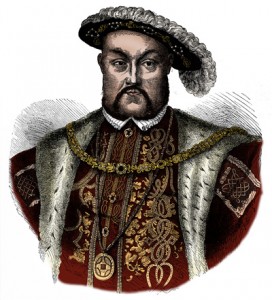 On this day in history, 28th June 1491, King Henry VIII was born at Greenwich Palace. To celebrate his 525th birthday, I’m sharing an extract from my book Illustrated Kings and Queens of England on Henry VIII…
On this day in history, 28th June 1491, King Henry VIII was born at Greenwich Palace. To celebrate his 525th birthday, I’m sharing an extract from my book Illustrated Kings and Queens of England on Henry VIII…
Henry VIII (1491-1547)
Rule: 1509-1547
Marriages: Catherine of Aragon (annulled), Anne Boleyn (executed for alleged treason), Jane Seymour (died after childbirth), Anne of Cleves (annulled), Catherine Howard (executed for alleged treason) and Catherine Parr (outlived him).
Issue: By Catherine of Aragon: Henry, Duke of Cornwall (died in infancy), and Mary I; by Anne Boleyn: Elizabeth I; by Jane Seymour: Edward VI; by his mistress Elizabeth Blount: illegitimate son Henry Fitzroy, Duke of Richmond and Somerset, who died at the age of 17.
Henry VIII was born on 28 June 1491 at Greenwich Palace. He was the second son of Henry VII and Elizabeth of York, but became heir to the throne when his brother Arthur died in 1502. He inherited the throne on the death of his father in April 1509, when he was just 17 years old, and he was crowned on 24 June 1509 in a joint coronation with his new bride Catherine of Aragon, the widow of his brother.
His reign was seen as the start of a new era, after his father’s harsh regime, and Henry was very much a Renaissance prince at the start, with his charm, good looks, intelligence, love of sport and desire to fight bribery and corruption. However, he has gone down in history as a larger than life, hulk of a man who had six wives and who executed two of them, and who, according to one contemporary source, executed 72,000 during his reign. His reign is famous for the break with Rome which happened as a result of Henry VIII’s ‘Great Matter’, his quest for an annulment of his marriage to his first wife Catherine of Aragon. Catherine had been unable to provide Henry with a living son and Henry had come to view the marriage as contrary to God’s laws, since Catherine was his brother’s widow. He had also fallen in love with Anne Boleyn. The Pope refused to grant Henry an annulment, but Henry took matters into his own hands after reading that kings and princes were only answerable to God. The marriage was annulled in 1533, Henry VIII married Anne Boleyn and the Reformation Parliament of 1529-1536 passed the main pieces of legislation which led to the break with Rome and the English Reformation.
His achievements included the founding of the English Navy, the foundation of the Church of England after the break with Rome, his patronage of the Arts and his bringing the Renaissance to England, the establishment of the Kingdom of Ireland, his remodelling of government and taxation, his promotion of Parliament, the translation of the Bible into English, his major building programme, and the passing of the crown to his son Edward without opposition.
Henry VIII died on 28 January 1547 at the Palace of Whitehall. He was buried with his third wife Jane Seymour in St George’s Chapel, Windsor Castle.
Also on this day in history, 28th June 1461, Edward IV was crowned king at Westminster Abbey – click here to read more.
You can read more about Henry VIII in the following articles:
- The Birth of Henry VIII
- Henry VIII: Renaissance Prince and King
- Henry VIII: A Tyrant or Just Misunderstood
- 28 January 1547 – Death of Henry VIII
- Why I think Henry VIII was ultimately responsible for Anne Boleyn’s downfall
- Eustace Chapuys and the Tyrannical Henry VIII
Extract and picture taken from Illustrated Kings and Queens of England by Claire Ridgway.